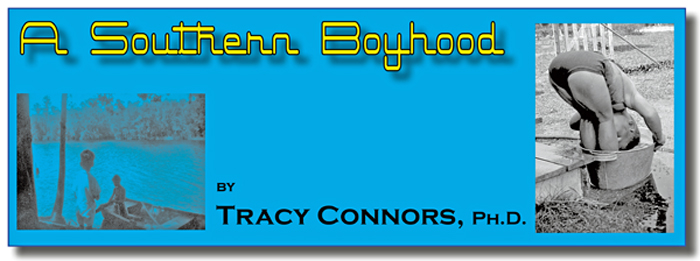From a slot machine, run by steam, to a boarding house that was serving suspicious “spare ribs,” a new Boy Scout Camper learns a lot while singing in the Pavillion.
Awful Camp Songs Sung on My First Camping Trip
In 1951, when I was barely eleven years old, I joined Boy Scout troop 222 in Jacksonville, Florida. My first camping trip took place shortly afterwards—a weekend trip to Camp Echockotee, on Doctor’s Lake near Orange Park, Florida.

After we arrived in late afternoon, we hiked for what seemed like miles out into the dense woods to our campsite. In a few minutes, we had the fire pit ready, the tents up, and our food hung high in a one of the many nearby trees to protect it from raccoons and especially those wild grizzly bears the veteran scouts had told us about. Strangely, they didn’t seem too worried about the bears, and snakes, and gators, and such.
It was almost dark, so we built a fire to keep the wolves away, but we didn’t cook anything that first night. We made sandwiches from Merita bread, dried beef and sliced tomatoes. Delicious. Then we headed off to what they called the pavilion for an Assembly.

It was now dark and we were moving rapidly down the trail leading to what I would later know was the center of the camp. At that point, I was stumbling along behind a patrol mate trying not to get lost or to trip over one of the many roots.
The other guys all had Scout flashlights, L-shaped green plastic flashlights with a clip on the side which let you hook it on your belt–next to your canteen, first aid kit, and the leather pouch which held your fork, knife and spoon. The best I could do was a few candles stashed back in my Army surplus duffle bag that was now in sway-backed pup tent back at our camp site.
Finally, we emerged from what must have been a complete traverse of the Okeefeenokee Swamp right in front of the Pavilion–an open at the sides circle of cypress logs supporting a conical roof. Tiers of seats were built between the logs to hold dozens of squirmy Scouts.
Several other troops camping there that weekend also appeared, to be greeted with catcalls and challenges by our guys. The Scoutmasters got us quiet by holding up their right hand in the Scout sign, three fingers together with the thumb across the palm holding the little finger. It meant “shut up, quiet, give your leaders your attention.” We quieted down.
For the next several hours we sang songs and we told “ghost stories.” The songs included old favorites like “Oh, du lieber Augustine.”
You remember!
“Oh, du lieber Augustine, slot machine, run by steam.
When you put a nickel in, nothing comes out.
You kick it, you sock it! You biff it, you boff it.
But, when you put a nickel in, nothing comes out!”
Then, there was that perennial favorite: “The Boarding House.”
“In the boarding house where I lived, things were always going wrong.
When the dog died, we had ‘pork chops.’
When the cat died, ‘catnip tea.’
When the landlord died, I left there.
‘Spare ribs’ were too much for me… too-o-o-o much fo-o-o-o-r me-e-e-e-e.”
We really liked the ending and tried to drag it out as long as we could.
[Note: the words we used were anonymous parodies of the German folk song of the same name.]
Some of the songs were rounds where each troop vied with each other to sing the loudest.The competition was fierce, with each troop screaming out its portion of the song.
Eventually, we got to I’ve Got Six Pence…
I’ve got six pence, jolly, jolly sixpence
I’ve got six pence to last me all my life
I’ve got tuppence to spend and tuppence to lend
and tuppence to send home to my wife, poor wife
No cares have I to grieve me
No silly little girls to deceive me
I’m as happy as a lark believe me
As we go rolling, rolling home.
Rolling home (rolling home) Rolling home (rolling home)
By the light of the silvery mo-oo-oo-oon
Happy is the day when the (camp staff get their pay)/(campers go away)
And we go rolling, rolling home.
[Repeat:
with four pence, giving no pence to my wife;
with tuppence, having only tuppence to spend; and
(sadly) with no pence.]
I sat high up on the fourth or fifth row; the older fellows and troops leaders sat on the lowest row. Next to me, on one of the old cypress logs, I noticed that merit badge symbols had been carved deep into the wood and then painted. Virtually all of the many merit badges we could earn as Scouts had been carefully carved into the wood by Scouts I would never know who had camped there before me.
I began to get some idea of the traditions of Scouting, and the sense of accomplishment one felt when the challenging requirements of a particular badge had been met and one could wear that symbol with pride on his merit badge sash.
Over half a century has passed since then, and many of those boys are now grandfathers themselves. Sadly, a growing number are now dead–lost to war, disease or accidents. But with a lump in my throat, I can still hear those sweet, young voices of pre-manhood laughing at “spare ribs” or screaming out songs to show pride in their troop.
When we had no voices left, the ghost stories began.
About ten o’clock, tired, hoarse and scared, we headed back through the woods to our campsite. I made sure I stayed in the middle of the file as we snaked down the dark and eerie path that was festooned with Spanish moss hanging from the huge oak trees. I didn’t want to become “gator bait” before my time.
© Tracy D. Connors 2015 All Rights Reserved
